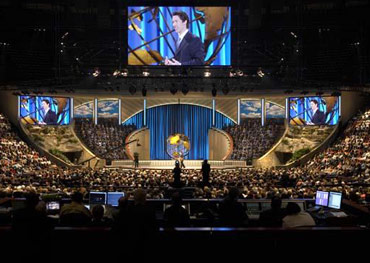Lost in translation: Six phrases that mean very different things in UK and US churches

Two countries divided by a common language. That's how Britain and the United States are often described, with their differing interpretations of potato chips, garbage, football and pants. The phenomenon is just as present in churches too, so when Christians in the US and UK hear some of the phrases listed below, they're picturing very different things...
Megachurch
In the United States, there are more than 50 churches with a weekly attendance of more than 10,000 people, with more than 40,000 attending the weekly meetings of Joel Osteen's Lakewood Church in Houston, Texas. This kind of football-stadium-size congregation is hard to comprehend for a British audience – we'd get very hung up on how you'd ever make tea for that many people – as when we use the term 'megachurch', we're referring to a 700-capacity Anglican church that manages to fill several Sunday services.
Teaching pastor
The trend for funky new names for church leaders has invaded the British Isles. We have senior pastors, lead ministers and even teaching pastors now, although in practice they all mean exactly the same thing. Larger American church staff teams have room for specialist teachers who spend half their week in a research library and half the week in a coffee house. In Britain these people are just choosing to list the coolest and most glamorous aspect of the job; they might equally call themselves 'Senior Toilet Unblocking Pastor'.
Coffee point
In America, some churches have on-site branches of Starbucks or even their own-brand competitor. Before arriving to hear Senior Teaching Pastor Mike start his series on Philippians, you can pick up a double shot caramel latte and a freshly-baked blueberry muffin from a smiling, uniformed young man named Chad. In the UK, Gladys leaves the sermon 10 minutes early to turn on the tea urn. Despite the general standard of drinks on offer, a queue will then snake round the building after the service, as congregants battle to get to the front before all the good biscuits have gone. I've heard rumours of custard creams at my church, though I've never actually seen one.
Church car park/parking lot
Imagine a piece of concrete, as vast as the ocean, stretching out as far as the eye can see. Now imagine two tiny spaces next to some bins. That's the difference.
Worship band
Anyone who's ever happened upon the broadcasts of US evangelist Jimmy Swaggart, recorded at Louisiana's Family Worship Center, will be familiar with the extraordinary sight of five to 10 professional-standard singers leading a congregation in worship. They'll be backed by a 50-member choir and a full complement of session musicians. And of course Jimmy himself, leading the way on piano with his own sweet redefinition of the word 'music'. In Britain, worship bands tend to be a little more reserved in terms of scale; drum kits appear to be either optional or frowned upon, and worship leaders often have to contend with last-minute texts from the keyboard player who forgot he was on the rota this morning.
Men's breakfast
I once attended an evangelistic men's event at one of the New York tabernacles. I returned home to England the following week fifteen pounds heavier. Those things aren't entirely unconnected; in America it seems, a men's breakfast involves preparing huge vats of delicious, piping-hot saturates to men who would be considered rude if they didn't return for both second and third helpings. Though there are exceptions, more often than not the British equivalent involves a bloke popping to Lidl the night before to pick up ten packs of value croissants.
Martin Saunders is a Contributing Editor for Christian Today and the Deputy CEO of Youthscape. You can follow him on Twitter @martinsaunders











